How Many Times a Day to Feed Betta Fish
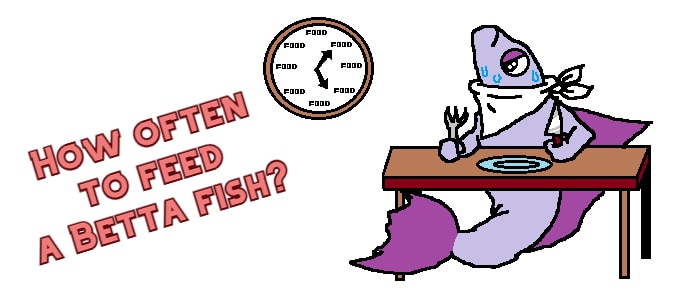
A good diverse diet is essential to keeping your Siamese Fighting fish in strong shape.
With practice, I've also learned that I need to know how often to feed my Betta fish each week for optimal results. Adhering to the best types of food and an adequate feeding schedule is crucial for avoiding the following myriad of complications in Bettas:
- overfeeding;
- digestive issues;
- a bloated belly or body.
But how many times per day should you offer food to your pet fish and can you occasionally skip giving it a meal?
Could it be that giving live and frozen treats to a Betta more often is better than letting it stuff its face with pellets on the regular?
Let me share with you some reliable tips on feeding frequency for Betta fish and help you take proper care of your new pet.
Let's dive in!
How often should you feed a Betta fish?
When deciding how often to feed your pet Betta, you should consider the fact these fish are opportunistic feeders in the wild.
In other words, they will eat as much as they can.
This explains why they'd often seem hungry. You shouldn't trust your Betta's huge appetite, as it will mislead you to overfeed it, which isn't good for your pet's health.
Furthermore, adding too much food to the aquarium can overwhelm its biofilter with organic waste. This can lead to ammonia spikes that can be detrimental to all aquatic life inside.
That being said, here's how often to feed your Betta fish for optimal results in the long run:
Betta fish should be fed small volumes of food once a day. The volume of each meal should be equal to the size of the fish's eyeball. It's recommended to skip a feeding day once per week to give your Betta's digestive tract time to clean out and work properly.
Some aquarists would suggest feeding a Betta twice a day.
Through my experience, I've found that feeding once daily works better.
When only feeding it once, the fish remains more energetic throughout the day. Ever since I've established this meal schedule for it, my Betta fish have never been bloated or constipated.
Furthermore, I find it more convenient for everyone involved.
Why should the volume of the food be as much as the Betta's eyeball?
There's something important you should know when establishing how much food you're supposed to give to your Betta:
There's a common belief among fish keepers that the amount of food given to a Betta should resemble the volume of its eye.
There's some good reasoning behind that – the fish's stomach is about that size.
Exceeding this amount will overwhelm your Betta's digestive system, which can become harmful with time. With that out of our way, I consider it essential to go over staple Betta foods and treats that will keep your pet strong and beautiful in the long run.
What are the best foods for a Betta in the long run?
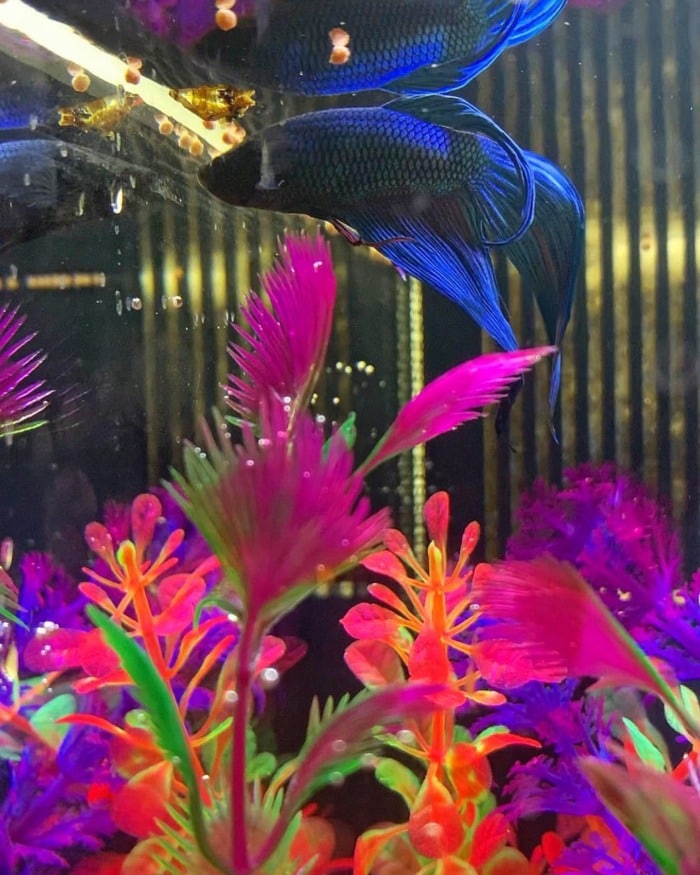
by _CSR-98
Bettas are strict carnivores and their digestive tract has evolved to break down meat and fiber from the chitin exoskeletons of insects and other invertebrates. This is the reason you may have heard that it's not a good idea to put a Betta with small shrimp in the same tank.
Ideally, it's best to give your Betta food that closely resembles what the fish would eat in the wild. This would include:
- bloodworms;
- daphnia;
- mysis shrimp;
- brine shrimp.
Here's a list of foods and treats that explains how they would affect your Betta in the long run:
Live foods: Bloodworms, Daphnia, Brine shrimp, Mysis shrimp
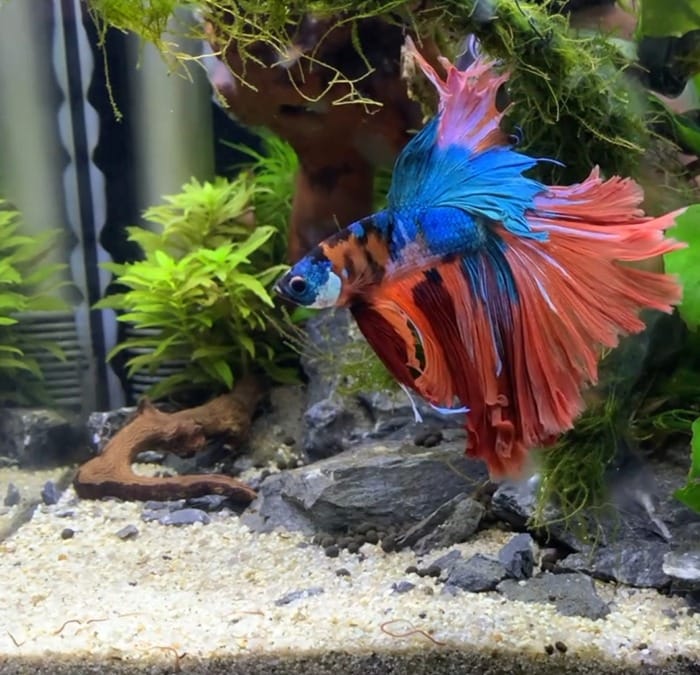
by Chrisgee92
While live foods are the best and most nutritious food options for your Betta, it can be somewhat hard to get them regularly.
You should have a trusted live food source, or use kits for hatching brine shrimp or daphnia at home.
Still, I recommend trying to include these types of meaty foods as a staple in your Betta's diet.
A diverse diet consisting of these types of food is very likely to keep your Betta healthy in the long run. Furthermore, as a result, its colors would get much brighter and more intense, enhancing its beauty.
That's because bright colors in fish generally mean that the fish is healthy and therefore ready to take on a fight or mate.
Author's Note: Feeding your Betta Tubifex worms as an occasional treat isn't a bad idea as well, even though they aren't part of the fish's diet in the wild. Just make sure you get them from a reputable vendor.
Frozen foods
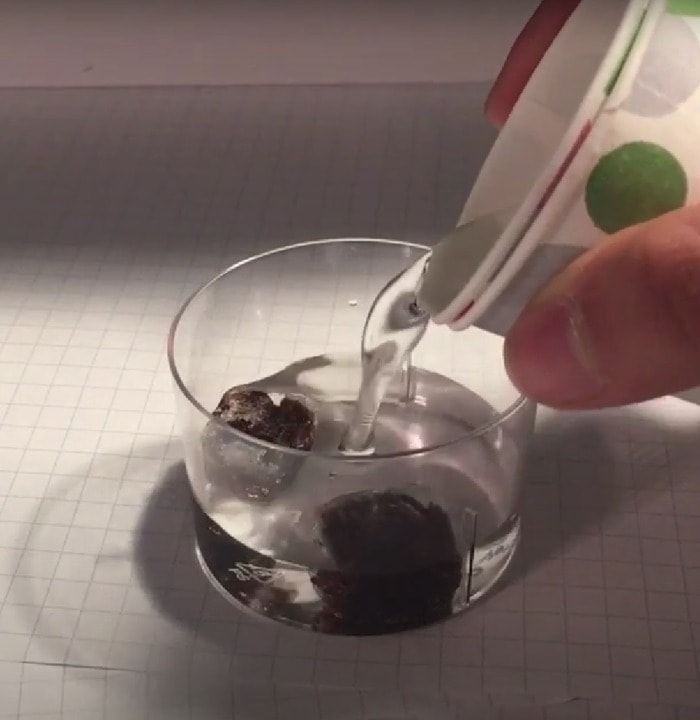
by Tropical Fish
As a great and more convenient alternative to live foods, you can get frozen bloodworms, daphnia, or Mysis shrimp cubes.
To use them, you should:
- Take a cube out of the freezer.
- Chip off the appropriate amount for a Betta meal.
- Let it thaw in a cup with aquarium water for about 30 minutes.
- Feed it to your fish.
You can put the rest of the food cube back in the fridge, conserving it in a ziploc bag or a small sealed container.
Once thawed and returned to the fridge, the Betta food cube can be used for the following 5 to 7 days.
I mainly use these frozen meaty foods to feed my Bettas.
Once or twice a week I'd treat my buddies to a portion of live food.
Freeze-dried foods
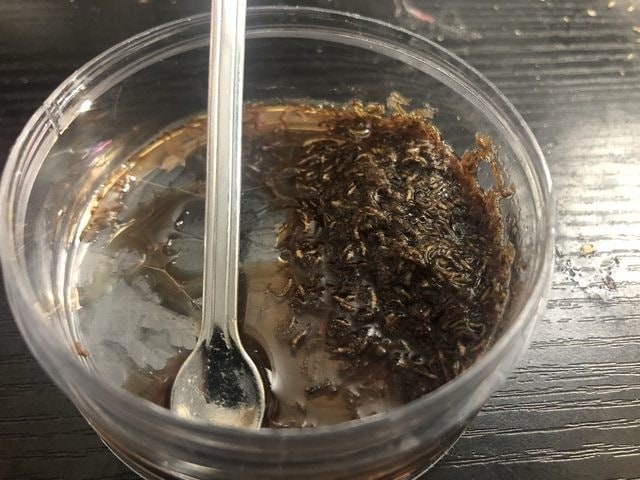
by nurbs
Freeze-dried foods are another way to provide your Bettas with protein and the right kind of fiber.
The thing is that during processing, these foods are stripped of their water contents.
This prevents harmful bacteria or parasites from contaminating them because life needs water.
Freeze-dried foods can be slightly harder to digest for the fish if not thawed properly.
Contrary to popular belief among fish keepers, there's nothing wrong with feeding your Betta these in the long run.
Anyway, freeze-dried Betta foods should be soaked in water for about 30 minutes before adding them to the fish tank.
This way you will ease your fish's digestion and avoid swollen belly and constipation.
Pellets
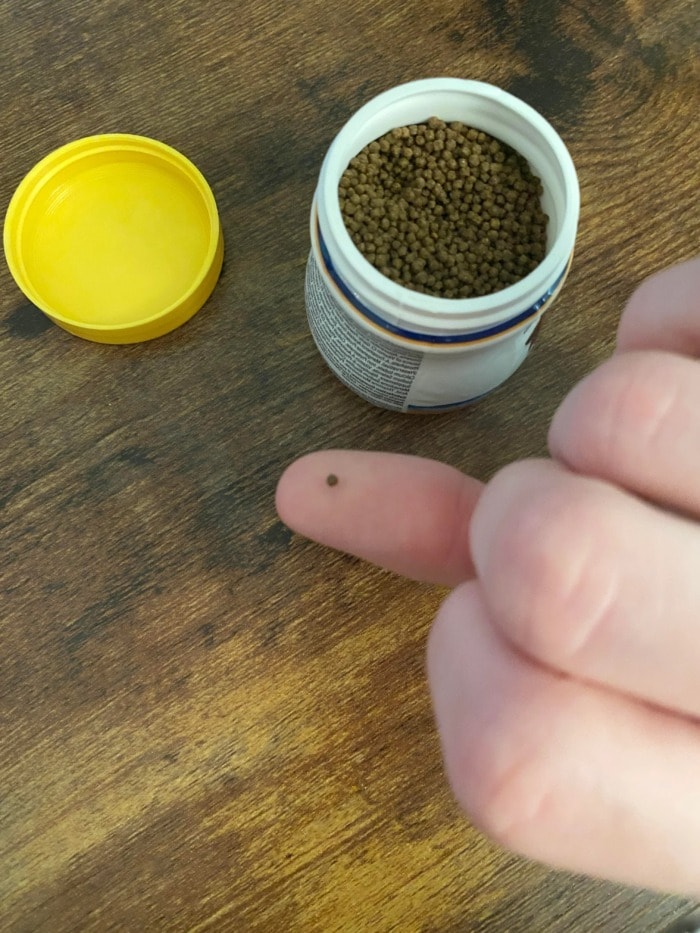
by Dim0ndDragon15
There are, in fact, pellets of higher quality that you can use to feed your Betta fish. Such pellets are the ones by New Life Spectrum or by Omega One Betta Buffet.
Nevertheless, I don't recommend feeding your Betta pellets every day.
On one side pellets contain highly processed protein, coming from a source that isn't part of the natural diet of the fish.
On the other hand, the fiber they contain doesn't come from insects, but from other sources such as peas and wheat flour.
Plant fibers aren't natural for your Betta's digestive tract either.
With that being said, most Betta keepers use pellets for their captive-bred specimens, which I don't necessarily agree with.
Author's note: Even though there are high-quality pellets on the market, most of them contain gluing agents and grains that may harm your Betta's digestive system in the long run. For this reason, I recommend giving pellets to your Betta fish no more than twice a week.
Tropical fish flakes
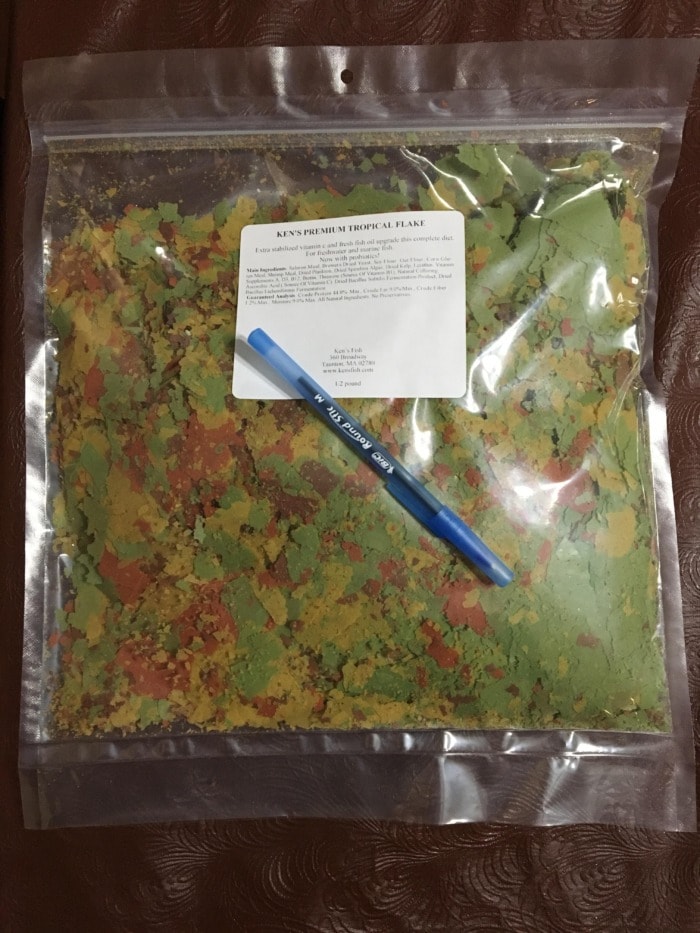
by plazman30
I don't recommend using flakes to feed your Betta, as they don't carry a lot of nutritional value for your pet. Furthermore, they tend to make a mess in the aquarium water, which can sometimes turn green as a result.
With that being said, if you have a community fish tank, it isn't a big deal if your Siamese fighter bites off pieces of the tropical flakes you give to the other fish. Try to target feed its tank mates and stay away from giving the Betta fish tropical flakes intentionally.
Human food
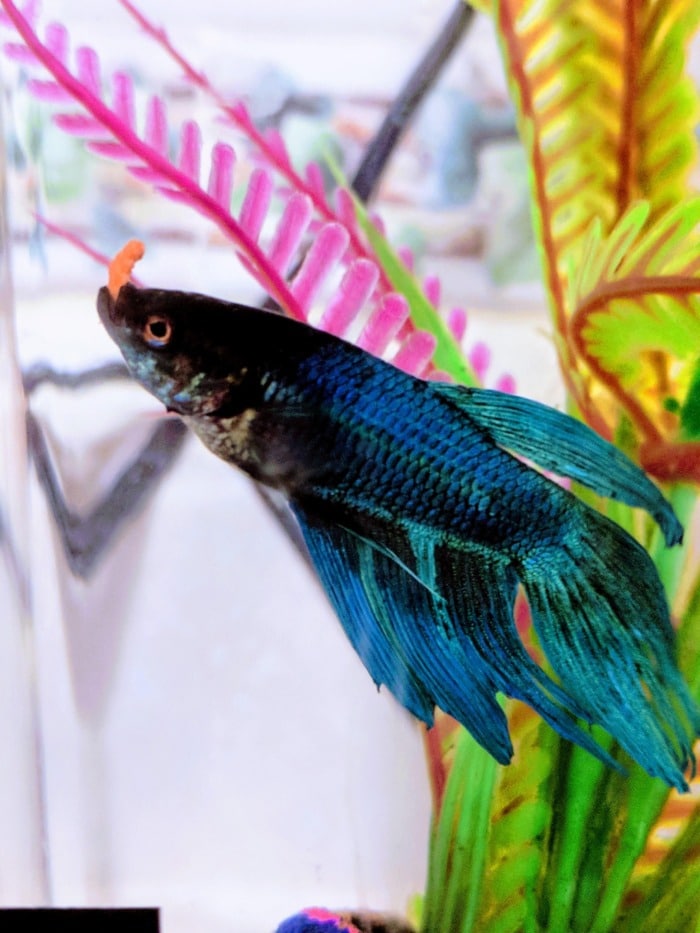
by Ipbunpak1
Some people suggest that you can improve your Betta fish's digestion by giving it a chopped bit of boiled peas or cucumber.
Nevertheless, this source of fiber isn't going to benefit a carnivorous Betta that much. When I want to add more fiber to my Betta's diet, I rely on Mysis shrimp or Daphnia.
Other aquarists would give their Bettas pieces of Walmart-bought salad shrimp, canned crab meat, and leafy greens such as spinach.
While your Siamese Fighting fish will gladly eat some of these human foods, I don't recommend including them as a regular part of your pet's diet.
An example calendar for a good Betta feeding Schedule
Considering the food recommendations above, you can play around with the different options to provide your pet fish with a diverse diet.
Here's a good weekly schedule for feeding an adult Betta:
- Monday: Live, frozen or freeze-dried Bloodworms or 2 to 3 high-quality pellets.
- Tuesday: Live, frozen or freeze-dried Bloodworms.
- Wednesday: Live, frozen or freeze-dried Daphnia.
- Thursday: Live, frozen or freeze-dried bloodworms or 2 to 3 high-quality pellets.
- Friday: Live, frozen or freeze-dried Mysis shrimp.
- Saturday: Skip Feeding.
- Sunday: Live, frozen or freeze-dried Daphnia.
As you see, the fasting day comes after the day I'd feed Mysis shrimp.
The latter is very rich in fiber, which is ideal because your Betta's stomach would take longer to digest the meal.
Also, don't worry about not feeding your pet fish.
In the wild, Betta fish don't get eaten every day, as in nature the food isn't always available. Actually, a healthy Betta can go without food for up to two weeks, so skipping a day of feeding is totally safe.
Author's Note: If your Betta is not eating as per usual, and has lost its appetite, then you may need to take a closer look at its health. In such scenarios the fish is likely stressed from something in its environment. More often than not, the stress would be from a sudden shift in the water's parameters.
Feeding frequency for a baby Betta
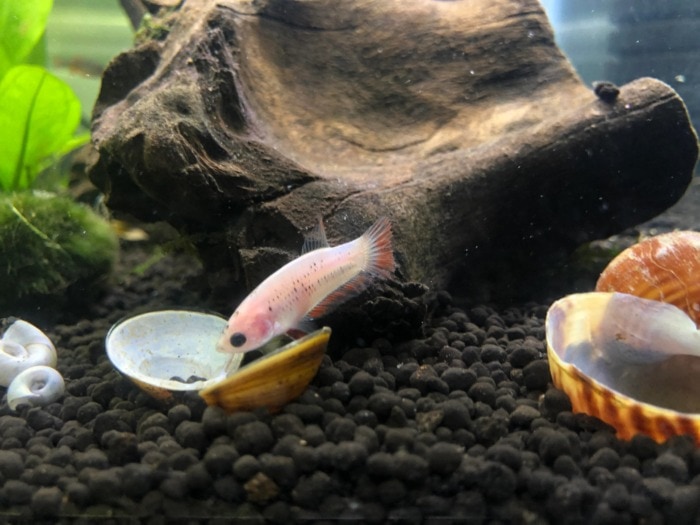
by StealYourChase
Baby Bettas should be fed with nutritious foods such as baby brine shrimp and microworms twice a day.
After the second month, you can add frozen daphnia, brine, or Mysis shrimp to the fry's menu.
You shouldn't give your young Siamese Fighting Fish baby pellets before it reaches 3 months of age.
After that, you can safely include them as part of the Betta's diet.
Author's note: Some breeders would raise their Betta fish on flakes so that it doesn't refuse to eat pellets in the future. Even though this practice makes feeding the Betta easier, it can hinder the fish's development and its overall well-being in the long run.
Final words
Feeding your Betta too much and too often can be bad for its health.
If in doubt, you could follow my weekly feeding schedule.
Some people prefer splitting the meal in two and feeding their Bettas twice – once in the morning and once in the evening.
To be fair, as long as you take the meal's size into consideration, and provide your Betta with a good diverse diet, you're good to go.
Leave me a comment below if you have any questions!
Source: https://aquanswers.com/how-often-to-feed-betta-fish/
0 Response to "How Many Times a Day to Feed Betta Fish"
Post a Comment